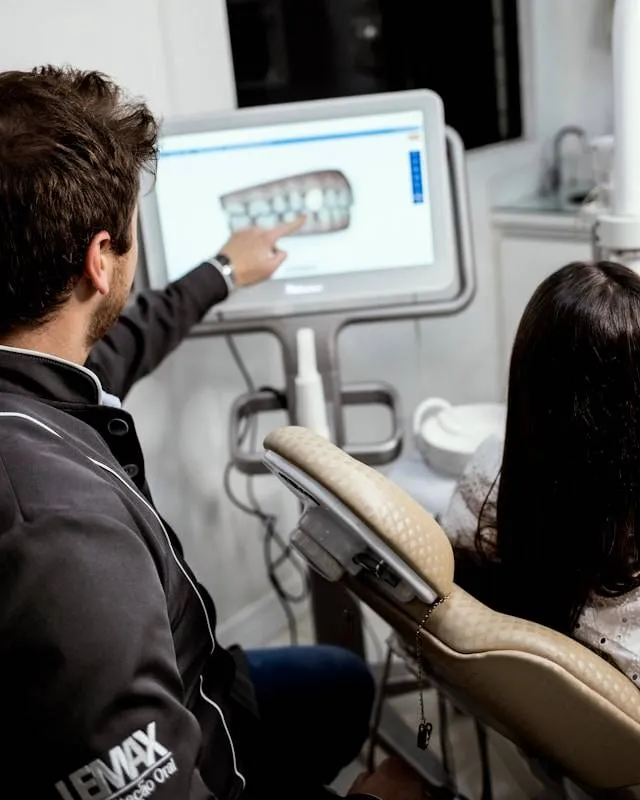1. What is periodontitis?
Periodontics is the branch of dentistry concerned with the prevention, diagnosis, and treatment of diseases and conditions that affect the supporting structures of the teeth. These structures include the gums, alveolar bone (the part of the jaw where the tooth roots are located), periodontal ligament (the connective tissue that holds the teeth in place), and cementum (the surface layer of the tooth roots). The term “ periodontics ” comes from the Greek words “peri,” meaning around, and “odont,” meaning tooth.
Periodontology focuses primarily on inflammation and disease of these structures, collectively known as periodontal disease or periodontitis. Periodontal disease is caused by bacteria in dental plaque, which causes a sticky, colorless film to form on the teeth. If not removed by regular brushing and flossing, these bacteria can cause the gums to become inflamed and infected. If left untreated, the disease can lead to tooth loss.
A periodontist is a dentist who has undergone years of training after graduating from dental school, specializing in the prevention, diagnosis, and treatment of periodontal disease. They are also experts in treating oral infections and in placing, maintaining, and repairing dental implants.
Periodontists are skilled at detecting and treating gum disease in its early stages. They can provide a variety of treatments, including scaling and root planing (in which the infected root surfaces are cleaned) or root planing (in which damaged tissue is removed). They can also treat more serious gum problems with a variety of surgical procedures.
Additionally, periodontists are specially trained in the installation, maintenance, and repair of dental implants. Dental implants are artificial tooth roots that provide a permanent base for fixed replacement teeth and are an effective solution for people with missing teeth or chronic dental problems.
It is important to note that periodontal health must be achieved in a minimally invasive and cost-effective manner. Finally, periodontists are also experts in providing advice and treatment to help people maintain healthy gums, including professional cleaning techniques and guidance on effective home care strategies.
In short, periodontics is an essential area of dentistry that focuses on the health and integrity of the structures that support our teeth. Regular visits to the dentist, along with good oral hygiene practices at home, can help prevent disease. However, if such problems do occur, your dentist has the expertise to provide effective treatment.
2.2. What causes periodontal disease?
The main cause of periodontal disease is plaque, a sticky film of bacteria that constantly forms on our teeth. However, other factors can contribute to the disease, such as smoking, poor oral hygiene, hormonal changes, genetic predisposition, stress, poor nutrition, and the use of certain medications.
2.3. What are the symptoms of periodontal disease?
Some common symptoms of periodontal disease include red, swollen or tender gums, bleeding when brushing or flossing, persistent bad breath, receding gums, loose or shifting teeth, and changes in the way your teeth fit together when you bite.
2.4. Can periodontal disease be cured?
If caught in its early stages, the disease can be reversed with appropriate treatment. However, if the condition has progressed to a more severe stage, specialist treatment or surgical procedures may be required to prevent further damage and restore gum health.
2.5. How can I prevent periodontal disease?
The way to prevent this disease is to practice good oral hygiene. This includes brushing your teeth at least twice a day, flossing daily, eating a healthy diet, and visiting your dentist regularly for checkups and professional cleanings.
2.6. How is periodontal disease treated?
Treatment varies depending on the severity of the condition. Nonsurgical treatments may include scaling and root planing (deep cleaning) and medicated mouthwashes. More advanced cases may require surgical treatments such as bone grafting or tissue regenerative procedures.
2.7. Can periodontal disease lead to other health problems?
Yes, research has shown that periodontal disease is linked to other chronic inflammatory diseases, such as diabetes and cardiovascular disease. Therefore, managing the disease can help improve your overall health.
2.8. How often should I see a dentist for periodontal care?
If you have been diagnosed with periodontal disease, you may need to see your periodontist more often than your regular dental checkups. Your dentist will be able to recommend an appropriate schedule based on your individual needs and the severity of your condition.
We all know that early detection and treatment are key to stopping the progression of periodontal disease. If you are experiencing any of these symptoms or have any concerns about your oral health, don’t hesitate to contact your healthcare professional.
2.9. How can I prevent periodontal disease?
The way to prevent the disease is to practice good oral hygiene. This includes brushing your teeth at least twice a day, flossing daily, and having regular dental checkups. Lifestyle factors such as maintaining a balanced diet, not smoking, and managing stress can also help reduce your risk of developing periodontal disease.
2.10. Can periodontal disease recur?
Yes, periodontal disease can recur if you do not maintain good oral hygiene habits after treatment. That is why regular follow-up visits are so important. During these visits, your dentist will clean your teeth, assess the health of your gums, and make sure your oral hygiene measures are effective.






